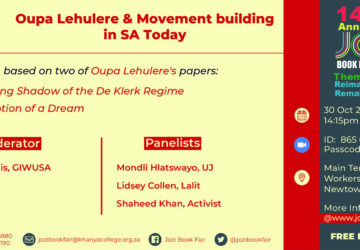| Download PDF |
Most countries affected by the COVID-19 pandemic went on lockdown, limiting contact between people so as to avoid the spread of the coronavirus. Although this may have been the right decision in some countries, to keep people safe from getting infected, to others the lockdown brought sorrows. Some companies are closing their gates and calling workers to tell them they no longer have jobs. This has only added to the already high rate of unemployment. The lockdown has not been all good or kind to most people who now face unemployment and have difficulties paying rent and maintaining their families.
People who have travelled from their home provinces seeking work in Gauteng will now face challenges because they no longer have work. Since the window to make one-way travel from one area to another has been opened, some people have resorted to selling their belongings so that they can afford the trip home. Some of these people have taken to social media to share how the lockdown affected them, their concerns regarding how they will survive after this, and asking for any assistance from those who are able.
The pandemic is also affecting relationships in homes. Without any measures put in place to regulate rent and other financial obligations, tenants face landlords who demand rent because they too depend on that money to support their families.
A 29-year-old lady who rents a flat in Johannesburg said she had found a job at a VIP hotel just two months ago. She said she does not yet qualify for a UIF. The lady said she left her home so she could get a job and work to provide for her children and her two younger sisters, as well as to assist her grandmother. She and her siblings lost their parents. She said they were called in for a meeting at work and were told the hotel will not be paying them anymore since no money was coming in anymore. Hotel employees’ jobs have now been put on hold.
“This is depressing and devastating mostly because now I cannot afford to pay rent. My roommate left when the lockdown started and now I’m alone. The landlord understood when I told him that I will try to leave before the 7th [of May] but I’m still waiting on my family member to send money”, said the 29-year-old. She is just one of many who have shared similar stories on Facebook and Twitter in frustration with the lockdown.
Small business owners are also sharing how this has affected them. They say they cannot bear the pain of telling their employees that there’s no longer any work. These owners do not see any coming back from the losses they have suffered during this pandemic. Things are much harder for unregistered businesses as they cannot ask for government help.
The majority of South Africans face troubling times unless the rich give back some of the money they keep private. That money can help small businesses and help to strengthen the poor communities. Being unemployed while having dependants looking at you to provide for them will cause working class people more mental health problems and breed more violence in homes.
This Opinion Piece article was submitted on 7 May 2020. You may republish this article, so long as you credit the authors and Karibu! Online (www.Karibu.org.za), and do not change the text. Please include a link back to the original article.


















































